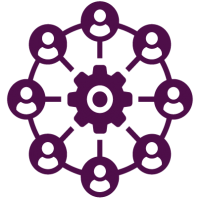
A key component of our shared Collective Impact Strategy revolves around sharing and measuring data and results. By analyzing key indicators, we make informed decisions to allocate resources effectively and implement targeted interventions. Through collaboration, we identify trends, evaluate program effectiveness, and advocate for policy changes, fostering a community committed to youth success.
Dashboard Navigation
- Click on the indicator menu buttons below to navigate to a large graph displaying progress data on that indicator
- Each data indicator contains two pages: a graph page and an in-depth page:
- The graph page includes data points that enable us to see the big picture of where we currently stand. Users can hover over data points for a more comprehensive data view. Users can also filter the data using the tools in the right-hand margin (where appropriate)
- The in-depth page is a deeper dive into the specific indicator, and its trends, and highlights United for Youth (U4Y) partners addressing the specific subject. These pages also contain links for additional information
- The graph page includes data points that enable us to see the big picture of where we currently stand. Users can hover over data points for a more comprehensive data view. Users can also filter the data using the tools in the right-hand margin (where appropriate)
Something missing? We've made every effort to provide an all-encompassing set of data points indicating youth success. If we've missed something, we welcome your feedback. Please click on the + sign below and follow the prompts in the fields provided to add your thoughts on additional data that should be tracked and shared.
 Our History
Our History
Curated by U4Y's Results Based Accountability (RBA) workgroup, the dashboard's indicators result from a year-long research project involving diverse partners. This cross-sector team, including health professionals, youth program providers, data specialists, and community members, ensured the selection of powerful indicators for our Bold Community Goal. Supported by the RBA workgroup, the dashboard continually evolves across platforms, shaped by regular stakeholder discussions on content, sources, and layout to meet ongoing community needs.
 About & Why We Share Data
About & Why We Share Data
Community-specific data, combined with youth, family, educator, and community insights, guides our work. Sharing accurate data leads to transparent practices, mutual accountability, and community understanding. This enables collaborative problem-solving, shared learning, and resource alignment for effective support.
Some indicators compare Buncombe County to North Carolina, while others provide subgroup data (All Students, Students of Color, Economically Disadvantaged, English Learners, Hispanic, Homeless, Multi-Racial, Students with Disabilities, and White Students). For confidentiality, data reporting follows masking and student data laws.
Our dashboard offers accessible, downloadable raw data linked directly to sources. Annual updates reflect source timelines, with some indicators possibly updating sooner. Percentage calculations are applied to certain indicators, while others compare data without additional calculations.
Data gaps exist due to student data laws or pandemic-related reporting gaps.

Resources
As the Backbone Organization to U4Y, United Way of Asheville and Buncombe County collaborates with U4Y partners to keep this information rich and continuously developing. Click HERE to explore additional resources illuminating our collective work, the data we collect, and an insightful glossary of terms.
